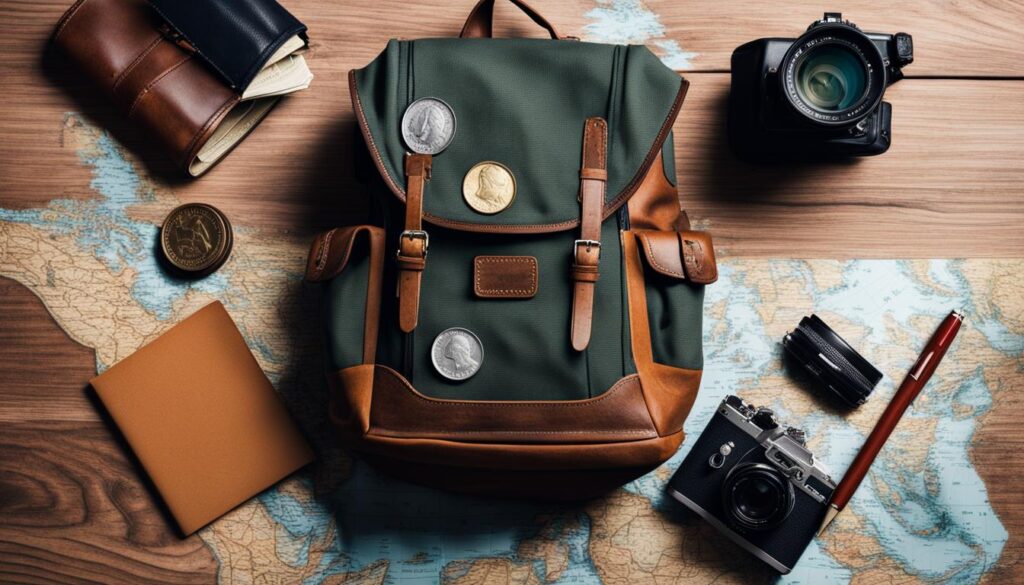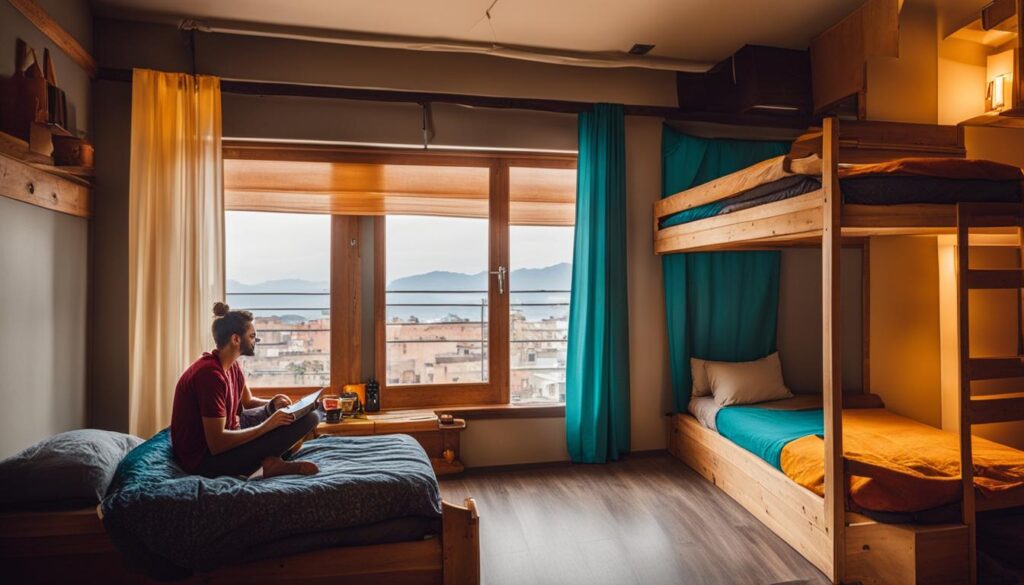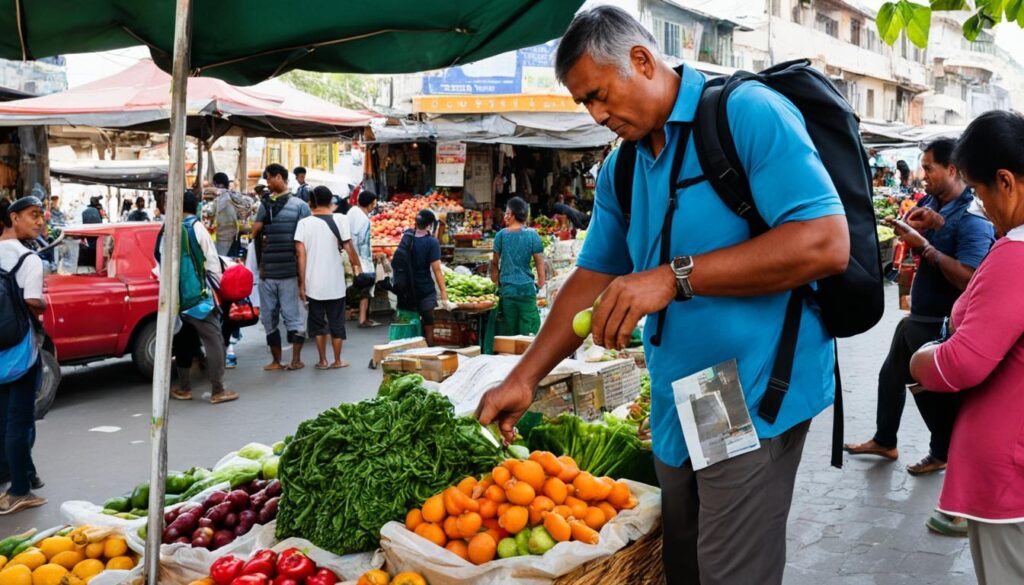Are you planning an extended travel adventure or a long-term trip around the world? If so, budgeting is one of the most critical factors to consider for the sustainable financial health of your journey. To help you achieve this, we have gathered expert tips and strategies that will guide you throughout your trip to ensure that you have a smooth and memorable travel experience. By implementing these long-term travel budgeting tips and long-term travel finance tips, you will learn how to save money effectively while still enjoying your travels.
Set a Realistic Travel Budget
Before embarking on your long-term travel journey, it’s important to set a realistic travel budget. This will ensure that you have enough funds to cover all your expenses while on the road. To create a comprehensive budget, consider your travel style, preferred destinations, and anticipated expenses.
| Expenses to Consider | Examples |
|---|---|
| Accommodation | Hostels Airbnb rentals Hotels |
| Transportation | Flights Trains Buses |
| Food and Drinks | Restaurants Street food Supermarket groceries |
| Activities and Sightseeing | Tours Museums Adventure activities |
Once you have a list of anticipated expenses, research the costs for each item and budget accordingly. Don’t forget to factor in unexpected expenses and emergencies.
By setting a realistic travel budget, you can better manage your finances and avoid overspending.
Research Your Destinations
To start saving money for long-term travel, researching your destinations in advance can go a long way in stretching your travel budget. Look for budget-friendly destinations that offer plenty of free or cheap things to do. Use money-saving tips for long-term travel, such as discount passes, travel cards, or free activities, to plan an itinerary that won’t break the bank.
Here are some tips on how to research your destinations:
| Tip | Description |
|---|---|
| Check the Local Tourism Websites | In addition to providing valuable information about the area’s attractions and events, many tourism websites offer exclusive deals on popular tours and activities. Plus, they may have suggestions for budget-friendly lodging and dining. |
| Read Travel Guidebooks | Travel guidebooks are a great way to get an overview of your destination, and many offer insider tips on how to save money while exploring the area. Check out Fodor’s, Lonely Planet, or Rough Guides, to name a few. |
| Ask Locals | One of the best ways to find affordable activities, attractions, and dining is by asking the locals. Strike up a conversation with a friendly bartender or your Airbnb host to get insider information about the area. |
By researching and planning ahead, you can make informed decisions, find affordable accommodations, and stretch your travel budget. Don’t be afraid to get creative and find unique ways to save money while traveling. After all, saving money for long-term travel means more time on the road and more unforgettable experiences.

Track Your Expenses
When it comes to managing finances for long-term travel, tracking your expenses is key. By recording your daily expenditures, you’ll be able to stay within your budget and identify areas where you can cut back and save money. Use apps or spreadsheets to keep track of your spending on accommodations, transportation, meals, and activities.
Use Budgeting Apps
There are numerous budgeting apps available that can make tracking your expenses a breeze. Some popular options include:
| App Name | Description |
|---|---|
| Mint | A free app that links to your bank accounts and credit cards, automatically categorizing your expenses so you can see where your money is going. |
| Trail Wallet | An app specifically designed for travelers that allows you to set a daily budget and track spending in multiple currencies. |
| You Need a Budget (YNAB) | An app that emphasizes proactive budgeting and helps you get ahead of your expenses. |
Choose an app that suits your needs and preferences, and make sure to use it consistently to keep track of your expenses.
Analyze Your Spending Patterns
Periodically analyzing your spending patterns can help you identify areas where you can cut back and save money. Look for trends in your spending, such as excessive spending on meals out or pricey activities, and brainstorm ways to reduce these expenses. For example, you might opt to cook more meals in your accommodations or seek out free or low-cost activities.
In conclusion, tracking your expenses while traveling long-term is crucial for managing your finances effectively. Use budgeting apps to make the process easier, and be diligent about recording your daily expenses. By analyzing your spending patterns, you’ll be able to identify areas where you can cut back and save money, helping you stay within your budget and prolong your travels.
Save Money on Accommodations
Accommodations can be a considerable expense during long-term travel. Luckily, there are plenty of budget-friendly options available for the savvy traveler.
- Consider staying in hostels, which can be much less expensive than hotels. Some hostels even offer private rooms for couples or families.
- Look for guesthouses or homestays, which can offer an authentic local experience at a fraction of the cost of a hotel.
- Short-term rentals, such as Airbnb, can also be a viable option for long-term travelers.
If you’re flexible with your location, consider staying in less touristy areas for lower prices. Look for deals and discounts on travel sites, and don’t be afraid to negotiate a better rate for longer stays.
Alternatives to Traditional Accommodations
In addition to the traditional options mentioned above, you can also consider alternative accommodations to save money on your long-term travels:
| Option | Description |
|---|---|
| House-sitting | Take care of someone’s home and/or pets while they’re away in exchange for free accommodation. |
| Couchsurfing | Stay with locals for free while they show you around their city. |
| Volunteering | Offer your skills and time in exchange for room and board. |
By exploring out-of-the-box accommodations, you can not only save money but also experience a destination in a unique and authentic way.
Remember, the less you spend on accommodations, the more money you’ll have for other parts of your trip. Keep an open mind and explore all of your options to find the best fit for your needs and budget.
Plan Your Meals Wisely
Dining out for every meal can quickly deplete your travel budget. To save money on food, cook your own meals whenever possible or opt for street food and local markets. Take advantage of happy hour specials or lunch deals at restaurants. Packing snacks or having a picnic can also help you save on dining expenses.
“Eating locally is not just an activity you do, but an interaction with the place and its people. You are not just fueling yourself with great food, but you become immersed in the culture and community.”
There is an incredible variety of food options available when traveling. By planning your meals wisely, you can enjoy delicious and authentic cuisine while also staying within your budget. Here are some budget travel tips for extended trips to help you save money on food:
| Tip | Description |
|---|---|
| Cook Your Own Meals | One of the most effective ways to save money on food is to cook your meals whenever possible. This is especially true if you’re staying in a place with a kitchen. Visit local markets to buy fresh ingredients and make your meals for a fraction of the cost of dining out. |
| Opt for Street Food and Local Markets | Street food and local markets are not only affordable, but they also offer a glimpse into local cuisine and culture. Look for food vendors with long lines and a local clientele for the best and most authentic food options. |
| Take Advantage of Happy Hour Specials and Lunch Deals | Many restaurants offer special deals during certain times of the day. Take advantage of happy hour specials or lunch deals to enjoy affordable meals at established restaurants. |
| Pack Snacks or Have a Picnic | When exploring a new place, pack snacks or have a picnic to avoid dining out for every meal. This is particularly useful for long bus or train rides where food options are limited or expensive. |
Your long-term travel budget will thank you for putting these money-saving tips for long-term travel into practice. Additionally, by cooking and indulging in street foods and local markets, you’ll experience the culinary side of the destinations in a way that’s both authentic and affordable.
Optimize Transportation Costs
Transportation costs can be a significant expense during long-term travel, but there are ways to reduce them and save money for other expenses. Consider the following tips for optimizing your transportation costs:
Research and Compare Transportation Options
Do your research and compare transportation options, including buses, trains, flights, and even hitchhiking. Look for affordable and reliable options, as well as discounts and promotions that could save you money.
“By being flexible with your travel dates or destination, you can find amazing deals that can save you hundreds of dollars.”
Look for Discounted Fares or Multi-Ride Passes
Look for discounted fares or multi-ride passes which can be cheaper than buying individual tickets. Consider using travel credit cards or loyalty programs to access exclusive travel deals.
Travel During Off-Peak Seasons
Consider traveling during off-peak seasons to take advantage of lower rates and avoid the crowds. Avoiding peak travel periods could help you save on transportation and accommodation costs.
Use Alternative Modes of Transportation
Consider using alternative modes of transportation, such as bicycles or walking, to minimize transportation expenses. Not only will this save you money, but it’s also a great way to explore your surroundings and stay active.
You can also reduce your transportation costs by carpooling with other travelers or using ride-sharing services. Whatever transportation options you choose, remember to stay safe, plan in advance, and keep track of your expenses.
Embrace Slow Travel
If you’re looking to travel long-term on a budget, opting for slow travel can be an effective strategy. By settling in one place for a longer period, you can save money and immerse yourself in the local culture.
Staying in one location for an extended period can significantly reduce your travel expenses. You can take advantage of long-term accommodation discounts and save money on rent. Additionally, you can cook your own meals, which can save you a considerable amount of money in the long run.
Embracing slow travel allows you to experience a destination more authentically. You’ll have time to explore the local culture and get to know the community. By immersing yourself in a new place, you’ll gain a deeper understanding of the destination and make more meaningful connections.
If you’re considering slow travel, take time to research your destination and select a location that aligns with your budget and interests. Plan your activities and outings in advance so that you can make the most of your time in one location.
Overall, embracing slow travel is an excellent way to explore the world on a budget. By staying in one place for an extended period, you can save money, experience a destination more authentically, and make meaningful connections.
Earn Money While Traveling
Long-term travel can be expensive, but it doesn’t have to be a drain on your finances. In fact, there are several ways to earn money while traveling that can help supplement your budget and extend your travels. Here are some long-term travel finance tips:
1. Freelance Work
If you have skills like writing, graphic design, programming, or photography, you can freelance in your field while on the road. Platforms like Upwork, Fiverr, and Freelancer.com allow you to find work opportunities that fit your skills and schedule.
2. Teaching English
English teaching is a reliable way of earning money while traveling. Many countries have a high demand for English teachers, and you don’t need to be a native speaker or have a teaching degree to get started. Check out teaching programs like LanguageCorps or International TEFL Academy for training and job placement opportunities.
3. Working in Local Establishments
If you prefer a more immersive travel experience, consider working in local establishments. You could find a job in a hostel, restaurant, or bar, for example. These jobs usually won’t pay a lot, but they can provide valuable cultural exchange and local insight. Just make sure you obtain the necessary work permits and visas before starting your job.
By earning money while traveling, you can help support your long-term travel budget and even make some new connections along the way. Remember to be open-minded, flexible, and proactive in your job search. Happy travels!
Conclusion
Congratulations on reaching the end of this guide on long-term travel budgeting tips! By implementing these strategies and tips, you can budget effectively for extended travel and ensure financial sustainability while on the road.
Remember to set a realistic budget, research your destinations, track your expenses, and save money on accommodations, meals, and transportation. Embracing slow travel and considering ways to earn money while traveling can also help extend your travels.
With these tips, you can have a fulfilling and enjoyable long-term travel experience without breaking the bank. Bon voyage!
















































